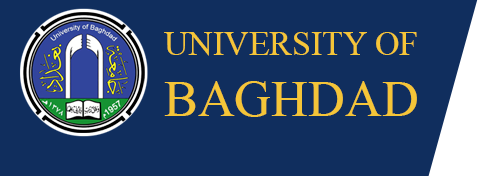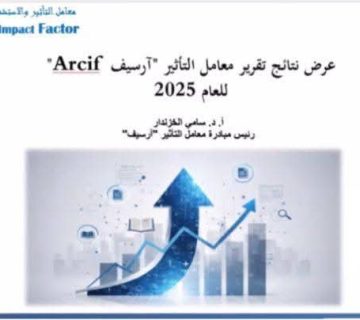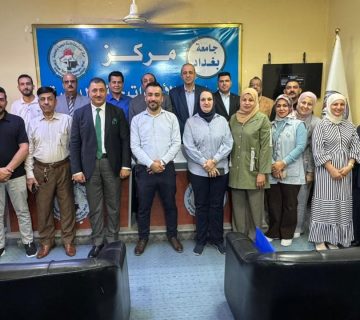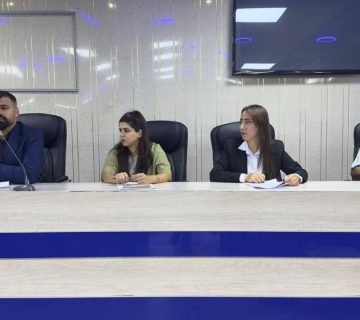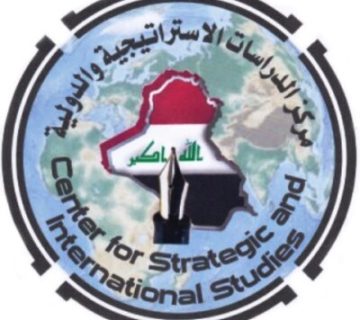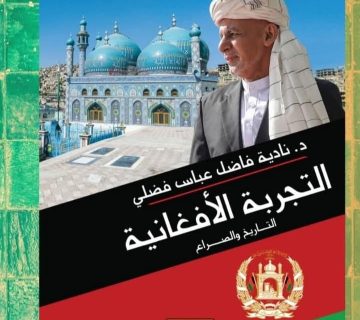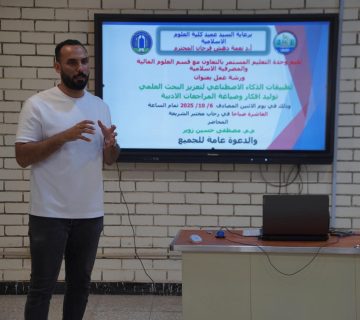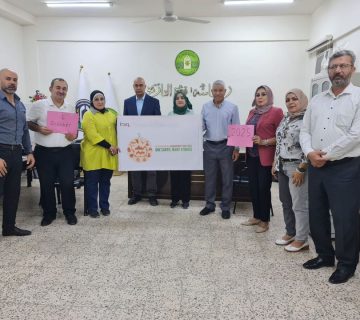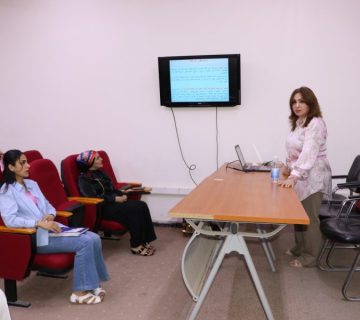Starting of the Activities of Second International Scientific Conference of the Institute of Genetic Engineering

Under the auspices of the Minister of Higher Education and Scientific Research and the presence of the President of University of Baghdad professor Dr. Alaa’ Abdulhussein Abdulrasul ,the Genetic Engineering and biogenic techniques of graduate studies in the University of Baghdad has held its second international conference .The Conference has begun with recitation from the Glorious Quran and then the opening speech of the conference has been delivered by the President of the University Prof. Dr. Alaa’ Abdulhussein Abdulrasul , representative of the Minister of Higher Education and Scientific Research, at which he has welcomed the attendees wishing the success, and then Mr. Dean of the Institute of genetic Engineering Prof. Dr. Abdulhussein al-Faisal has delivered a speech.
Where the grand central hall of celebrations (Al-Hakim Hall) has witnessed over two successive days the starting of the Second International Scientific Conference of the Institute of Genetic Engineering and biogenic techniques that came under the slogan “The university scientific research is in the service of society,” which has discussed the role of genetic engineering in the diagnosis of diseases and syndromes. The first subjects of the conference has began by playing the national anthem and then reading verses from the Glorious Quran.
Prof. Dr. Alaa’ Abdulhussein Abdulrasul , representative of the Minister of Higher Education and Scientific Research, has welcomed the great combination of professors, researchers and guests who were guests of the mother, university of Baghdad, where the university president stressed the work and seriousness in taking scientific steps to embodied the provided researches and not to leave the outputs of such researches be on the shelves because the basis of these meetings and conferences is a society. He also has urged that communication and teamwork between researchers from the University of Baghdad with foreign and participated countries should continue and to work together under the recommendations that will come out in this conference. The Chairman of the Preparatory Committee of the Conference Prof. Dr. Abdulhussein al-Faisal, the dean of Genetic Engineering Institute has delivered a speech where he has thanked all the audience of scientists and researchers from universities, scientific institutions and relevant ministries from both inside and outside Iraq for accepting the invitation and participating in this conference, which aims to highlight the important things that affect the lives of the Iraqi society and keep the developments occurring in the field of diagnosis of diseases and syndromes and follow up the developments taking place on the diagnosis level.He also has thanked the Arab and foreign guests who have held the trouble of traveling.
The dean Al- Faisal has added at the beginning of his speech the most important achievements of the Institute saying, “I am pleased and honored to be called in the academia medium that we are the jewel of the University of Baghdad, as the institute effectively contributed to get the world rankings through publishing more than 80 scientific papers globally at the impact factor journals in less than two years.” Al-Faisal has also referred to three patents in one year in the field of extraction of DNA with a single step and a very standard time and identifying the abnormal gene expression in an innovative chromosome. Furthermore ,the researchers have reached to devise a new class of wheat in Iraq recently as well as globally , our registration for more than (30) genetic sequence in well-known International Sites such as EMBL, NCBI .I would also like to announce that the Institute has succeeded in producing a number for the extraction of DNA and we will send those samples products to some university and medical laboratories ,standardization device and quality control in order to be provided cheaply, as well as we would like to inform your that we have a distinctive website which gains the first rank in the university and we have an electronic archive for all dissertations and theses that were completed at the Institute since its foundation till now and we have also an accredited scientific journal from the UNESCO.
He has concluded his speech wishing the guests good luck and lasting success in science service and has greeted our heroic Iraqi army and police and the crowd folk and the noble Arab tribes.
The scientific halls in the Central Library have witnessed on the first day of the start of the conference to discuss and review many diverse researches regarding cancer diseases, which the names of the research titles are : (assess the frequency of mutations of the fetus K-ras and P53 in Iraqi women with ovarian cancer, measurement of nucleic acids salivary minute Ribah ( has – 200 , has -amiR- and has-miR-93 has-miR-125a ) as a life indicator of the epithelial cells of oral cancer, molecular localization of gene expression for the leak of Eistein bar and a gene that suppresses cancerous Rb in tumor prostate and benign stromal, assessing the status of PIK3CA in breast cancer and its relationship to the expression of gene of ER, PR and HER- 2 in Iraqi women patients, screening for the genetic changes K-ras in codons 13/12 and 61 with breast Iraqis cancer patients, molecular description and enzymatic of enzyme FOX of Pittalaktames product of clinical isolates of bacteria Klebsiella pneumonia isolated from Najaf hospitals, comparative study of the molecular and immunological between diabetic patients with type I and 2 , the effect of expression of multiple resistance gene MDR1 and its relationship with the multiplicity of site models C1236T in Iraqi patients with acute leukemia myeloid, factor derived from and the growth factor of vascular endothelial in diabetic retinopathy, detecting gene CTX-M1 in isolates of Klebsiella pneumonia in the province of Najaf, evaluation of some genetic factors in patients with pneumonia joints in Iraq, relationship stimulating hormone vesicles FSH by the number of skin lines of the fingerprints in the sample (PCO) of multiple ovary bags syndrome, a genetic study of some bacterial etiology in people with rheumatoid eye and investigate the prevalence of the gene SEA, the relationship between the age of mother, father and tests of cellular and molecular abnormalities in Iraqi children with Down syndrome, multiple models of gene coding heat shock protein 70-2 hsp in urinary bladder cancer) The second day of the conference completed the first day in reviewing the submitted scientific researches by the involved researchers which dealt with the diagnosis of pathogens in (methylation gene p16 in Iraqi patients with colorectal adenomas and rectum, evaluating small tests cores nuclear division coefficient and migrainous Alkromatidi in lymph cells of human blood in local samples from Tuwaitha- Iraq , molecular diagnosis of bacteria Proteus mirabilis using Albulmra PCR technique among patients with urinary tract infections, molecular characterization of isolates of Staphylococcus aureus resistant to methicillin gained from society and isolated from clinical samples in Iraq, a comparative study between the screening of serological and molecular methods in order to detect filtrates of hepatitis (HBV) and (HCV) in patients with chronic renal failure in Nineveh -Iraq , a study of genetic mutations in a gene FLT / ITD for some Iraqi patients with acute blood with natural cell leukemia, an assessment of tumor gene protein bcr-abl/ P190 have some Iraq patients with lymphatic leukemia , immunological indicators HLA-linked DRB1, DQB disorders of the thyroid gland in a sample of Iraqi patients, detect anti-DNA HBC and HVB in blood donor samples non-container the surface antigen leaky hepatitis B in the Central Blood Bank in Mosul, , molecular detection of parasite Altoxollazma (Toxoplasmosis ) in serum samples of sheep, the impact of polluted environment in cellular divisions chicken embryos.
At the conclusion of the proceedings of the Second Scientific Conference the researchers have come out with the following recommendations:
- Emphasis on the study of pathological family history because it may be the only way to diagnose many diseases with Mendelian genetics.
- Legacies study at the molecular level in order to diagnose diseases and identify mutations types and to identify the people holding the disease who do not show any symptoms of the disease in the early stages.
- The production of drugs capable to target cancer cells by its distinction at the molecular level, which reduces the possibility of targeting healthy cells.
- Create especial databases of the results of Iraqi researches in this field .
- Training the people concerned with this specialization on the latest techniques of genetic diagnosis and contribute to the researches related to genetics at the province level and the establishment of training programs for the various disciplines of genetics.
- The establishment of the Department of Genetic Medicine, or the establishment of the unit of heredity at least in each hospital under the framework of genetic diagnosis to be the nucleus for the diagnosis, treatment and prevention of genetic diseases and the establishment of information unit and its statistics in the region and prepare for the programs of early screening of infants for genetic diseases so that all births will be examined for these diseases.
- There is an urgent need to build a genetic profile of each patient of cancer before his exposure to doses of chemotherapy because of differences in the genetic changes and genetic variability.
- An interest in studies related to common diseases between animals and humans by increasing the researches because of its relationship to increasing epidemiological genetic diseases.
- Students of masters and doctoral stages should participate in scientific conferences inside and outside the country for the purpose of taking advantage to build a new generation of scientists.
- conduct a field survey of the population of the Al-Tuwaitha area and assess the diseases caused by radiation.
